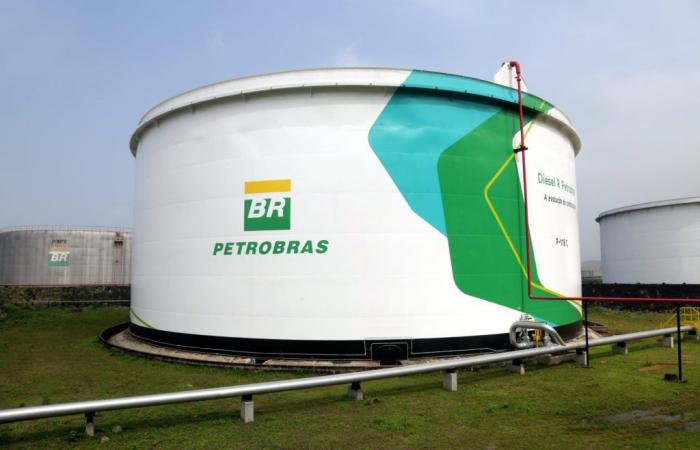With just over a month left to complete a year in action, the company’s current pricing policy Petrobras (PETR4) faces its first major acid test — a discount of 18% (R$ 0.63) on the price of gasoline and 8% (R$ 0.30) on diesel, and this in the midst of a major crisis policy surrounding its decision not to distribute extraordinary dividends. In parallel, there was a 6% drop in shares in the last month.
Price PETR4
Graph generated on: 04/01/2024
1 month
For Lucas Serra, analyst at Toro Investimentos, and Thiago Pedroso, head of variable income at Criteria Investimentos, the first year of Petrobras pricing policy — amended in May 2023 to allow greater spacing in readjustments made by the state-owned company — can be considered better than initially expected by the market. Until the beginning of 2024, the company had been able to overcome the fluctuations in the oil price consistently even during times of stress in the commodity market.
The same is not happening now. According to the Brazilian Association of Fuel Importers (Abicom), there are already 164 days without new adjustments in gasoline prices and 97 in the case of diesel. The company has already seen similar discounts in the recent past, but the current political context sends a yellow light to the market.
A new change in policy Petrobras prices does not seem to be on the table, but there is a latent concern, mainly with the diesel issue, as it tests how far the government can go with its interference within the company.
As Petrobras is not self-sufficient and depends on imports for internal supply, the reading is that it will need to transfer the amounts to avoid being faced with a risk of shortages and disruption of production chains. There is also the inflationary issue to be taken into account. If there is a spike in oil, the transfers could end up harming the monetary policy currently in force, slowing the fall in the Selic amid a rise in inflation, driven by fuel.
Despite being significant and an important test for Petrobras’ pricing policy, the current discount on the price of gasoline and diesel is not the only villain responsible for the drop in PETR4 papers. The company’s problem, at the moment, seems to be more linked to the work as a whole — the decision to withhold extraordinary dividends for investments that are still uncertain and, of course, the lack of readjustments that, in the long term, could hurt the company’s revenue.
The consensus is that a price adjustment will be a positive sign from management, but insufficient to pull the company out of the political hurricane in which it finds itself. For experts, a clearer signal about how the retained dividends will be invested and the non-interference of the state in the company’s management are what Petrobras needs to regain investor confidence and its market value lost in recent weeks.
Petrobras: what the junior companies in the oil sector look like
With the crisis at Petrobras, junior oil companies inherit part of the local flow of investors, but are unable to absorb the entire volume of migration from the state-owned company, says Pedroso, from Criteria. In this context, the upward movement shown by these companies tends to be only marginal and short-term.
According to him, the movement towards companies such as PRIO (PRIO3), 3R Petroleum (RRRP3) and PetroRecôncavo (RECV3) is, for the most part, made by local players. “Foreign investors, who are one of Petrobras’ major investors, are unlikely to enter these companies. What can bring appreciation to these assets is more related to the performance of the commodity and the operations of these companies”, he explains.
For Toro, international oil companies have the upper hand when comparing the size of the companies — and companies like British Petroleum (BP), ExxonMobil It is ConocoPhilipps end up benefiting from Petrobras’ outflow.
With oil at a level of US$87.90, the possibility of an increase in revenue and profit margins and good operational deliveries, experts see PRIO as the best placed to absorb part of the flow in Brazil, as it is exposed to the market international with 100% of its production exported.
3R, which also sells to the domestic market, could end up harmed by a possible extension of the negative interference in domestic prices.
Simone Tebet says she does not see government interference in the state-owned company
The Minister of Planning, Simone Tebet, said she did not see government interference in Petrobras and stated that President Luiz Inácio Lula da Silva exercised his right when he tried to place former minister Guido Mantega in Vale (VALE3).
The two offensives mentioned by Tebet were poorly received by investors and financial market analysts, who saw in them attempts by the government to intervene in companies, to subordinate them to Brasília’s interests. The minister’s statements were made on Saturday, in an interview with CNN.
“I don’t see (interference in Petrobras). There was a lot of talk that Petrobras lost R$50 billion, which it recovered in 15 days, but no one saw that it had the second highest historical value in the series of recent years”, said Tebet. “I haven’t seen that (interference).” The information is from the newspaper O Estado de S. Paul






